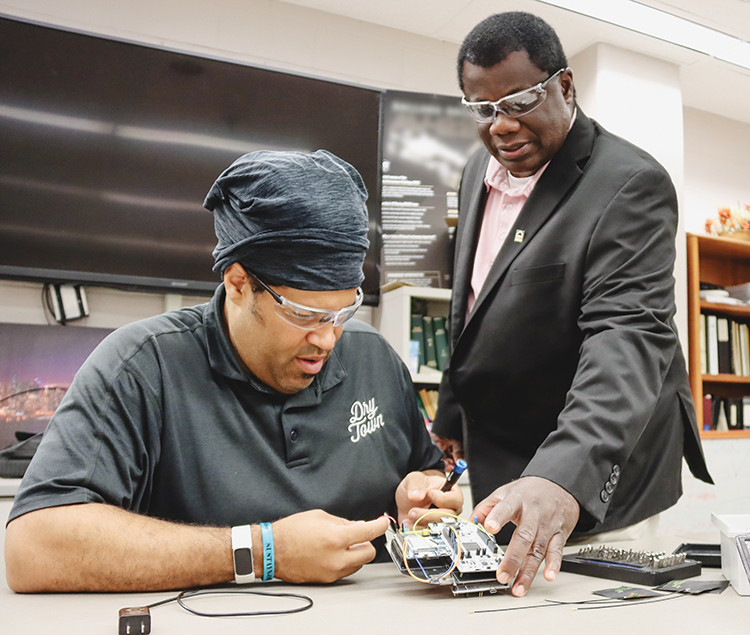Smart Signals, Small Towns

Low-cost Data Diode could bring lifesaving traffic tech to rural America
When one envisions smart and connected communities, a metropolis-like scene typically comes to mind. Purdue University researchers, however, are working to ensure that no small town gets technologically left behind.
Lyles School of Civil and Construction Engineering Professor Sam Labi leads a research team that is investigating cost-effective collection and distribution of intersection signal data. Fully termed the Low-Cost Unidirectional Connected Intersection Data box (LUCID) or simply, the Data Diode, the prototype device rapidly and securely shares real-time signal data with traffic centers, service and emergency workers, and other end users.
“As America continues to move forward and becomes faster in sharing data, smaller markets should not be forgotten,” Labi said. “Regardless of where you live, we want to ensure that the end users are able to receive relevant intersection signal information in a timely manner just as quickly as in a larger city.”
Funded through the United States Department of Transportation and Purdue’s Center for Connected and Automated Transportation, Labi said the Data Diode will use the cellular network to deliver information with emphasis on cyber-security and low implementation cost. This new device costs less than $200 per intersection, a sharp reduction from the $5,000 to $10,000 data collection equipment cost per intersection, Labi said. The low cost of the device makes it attractive for deployment in areas with limited budgets.

BELOW: Lyles School of Civil and Construction Engineering Professor Sam Labi (right) and graduate student researcher Richard Ajagu perform maintenance on the Data Diode.

Labi added that when its potential benefits become more widely recognized, the Data Diode will be made to scale up, thus reducing the unit cost of deployment even further and facilitating rapid delivery of intersection data in small towns and communities. “That, in turn, is expected to help promote the realization of widespread connected and intelligent transportation ecosystems,” Labi said.
Graduate student researcher Richard Ajagu said the team has been working with researchers at Virginia Tech, Purdue’s Elmore Family School of Electrical and Computer Engineering, the USDOT Volpe Center, the Michigan DOT, the City of Owosso, and T-Mobile. The current phase of the research is refining the system architecture using a novel programming language, to facilitate deployment.
“We’re at an exciting phase in our research as we prepare to deploy the Data Diode,” Ajagu said. “This will be the first step for small communities to gain greater access to traffic information so that we can all take the next giant leap forward together as a country. The Diode is an integral part of a larger novel systems approach that is utilizing IoT technology to promote affordable, connected and cyber-secure engineering for smart signals.”
Labi said his team will prepare a report by the end of 2025 and explore patent application for the system upon concluding the research.
